Pun in romeo and juliet act 2 – Puns in Romeo and Juliet Act 2 play a significant role in shaping the play’s themes, characters, and overall atmosphere. From Mercutio’s witty banter to the pivotal balcony scene, puns serve as both a source of humor and a means of foreshadowing and revealing character emotions.
In this exploration, we delve into the significance of puns in Act 2, examining their impact on the play’s characters and plot.
Pun as a Literary Device in Act 2
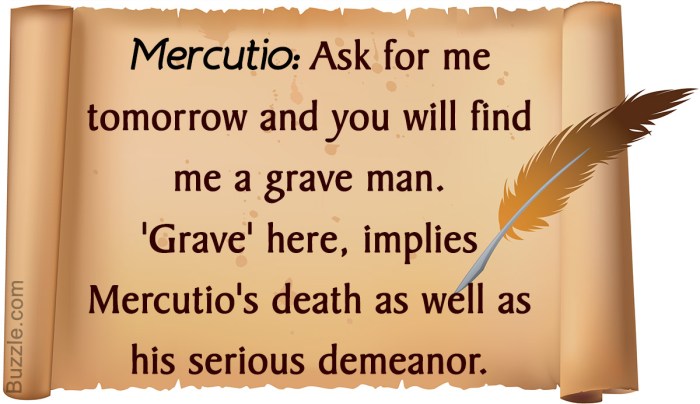
Puns, with their clever play on words, add depth and humor to Act 2 of Romeo and Juliet. They serve as literary devices that highlight characters’ wit, underscore themes, and provide comic relief.
Puns and Characterization
Puns reveal the characters’ intelligence and wordplay abilities. Romeo’s pun on his name in his first encounter with Juliet (“I am not I, if there be such an I”) showcases his quick wit and romantic charm. Mercutio’s puns, often bawdy and humorous, reflect his lively and playful nature.
Puns and Themes
Puns also contribute to the play’s central themes. Romeo’s puns on “light” and “dark” in his balcony scene with Juliet foreshadow the contrasting forces of love and hate that drive the play. Mercutio’s puns on “love” and “hate” highlight the play’s exploration of the complexities of human relationships.
Puns and Comic Relief
In a play filled with tragedy, puns provide much-needed comic relief. The Nurse’s malapropisms, such as “a man of wax” instead of “a man of wax,” add a touch of humor to the otherwise somber atmosphere. Mercutio’s puns on “prick” and “thrust” in the Queen Mab speech offer a moment of levity amidst the play’s growing tension.
The puns in Romeo and Juliet Act 2 add a touch of humor to the otherwise tragic play. One example is when Romeo says, “I am too sore enpierced with his shaft,” which is a pun on the word “pierced.”
If you’re looking for more puns, you can check out the unit 5 ap bio progress check . But don’t forget to come back and enjoy the puns in Romeo and Juliet Act 2.
Mercutio’s Use of Puns
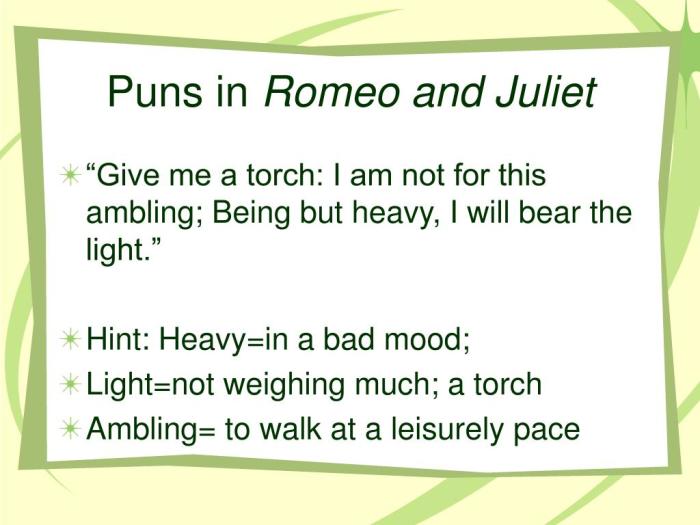
Mercutio, the witty and flamboyant companion of Romeo, is known for his clever use of puns. These puns not only add humor to the play but also reveal his sharp wit and tragic nature.
Mercutio’s Wit and Humor
Mercutio’s puns often showcase his quick wit and sharp tongue. For example, when Tybalt challenges Romeo to a duel, Mercutio quips, “Tybalt, the rat-catcher will catch thee.” This witty remark not only mocks Tybalt but also foreshadows his own tragic end, as he is later killed by Tybalt in a duel.
Mercutio’s Tragic Nature
Despite his humor, Mercutio’s puns also hint at his tragic fate. When Romeo is love-struck with Rosaline, Mercutio mocks him, saying, “If love be rough with you, be rough with love.” This line foreshadows Romeo’s tragic end, as his love for Juliet ultimately leads to his downfall.
Specific Examples from the Text
- “Tybalt, the rat-catcher will catch thee.”
- “If love be rough with you, be rough with love.”
- “Ask for me tomorrow, and you shall find me a grave man.”
The Function of Puns in Scene 4: Pun In Romeo And Juliet Act 2
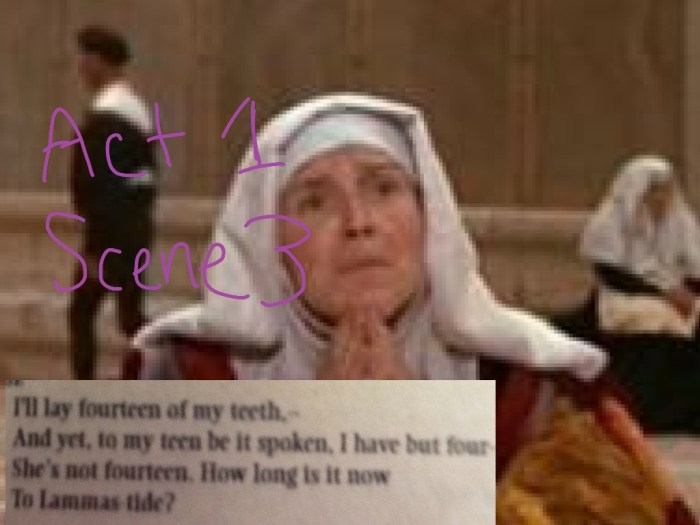
Scene 4 of Romeo and Juliet, the iconic balcony scene, is renowned for its romantic and passionate exchanges between the star-crossed lovers. However, within this scene’s lyrical tapestry, Shakespeare weaves a subtle yet profound use of puns that serve multiple functions, creating tension, foreshadowing events, and revealing the characters’ emotions.
Creating Tension
Puns introduce an element of wordplay and ambiguity, creating a sense of uncertainty and suspense. For instance, when Romeo utters, “But soft! What light through yonder window breaks? It is the east, and Juliet is the sun,” the pun on “sun” (both as a celestial body and Juliet) creates a momentary pause, heightening the anticipation of their impending encounter.
Foreshadowing Events, Pun in romeo and juliet act 2
Puns can also foreshadow events that will unfold later in the play. Romeo’s declaration, “Did my heart love till now? For I ne’er saw true beauty till this night,” ironically foreshadows the tragic events that will ultimately separate the lovers.
Revealing Character Emotions
Puns provide a glimpse into the characters’ inner emotions and motivations. Juliet’s playful pun, “My bounty is as boundless as the sea, My love as deep; the more I give to thee, The more I have, for both are infinite,” reveals her boundless love for Romeo and her willingness to sacrifice everything for him.
Puns and the Comic Relief
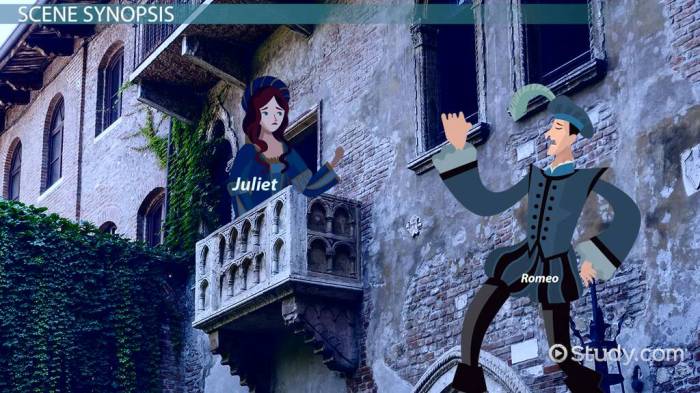
In the midst of the tragic events that unfold in Act 2 of Romeo and Juliet, Shakespeare employs puns as a clever and unexpected source of comic relief. These puns serve to lighten the play’s heavy atmosphere and provide moments of laughter amidst the impending doom.
Mercutio’s Witty Wordplay
Mercutio, the fiery and quick-witted companion of Romeo, is the primary source of puns in Act 2. His sharp tongue and love of wordplay inject humor into even the most tense situations.
- When Romeo expresses his love for Rosaline, Mercutio teases him, saying, “If love be rough with you, be rough with love.” This pun on the word “rough” both acknowledges Romeo’s heartache and pokes fun at his excessive romanticism.
- Later, when Mercutio is confronted by Tybalt, he responds with a series of witty puns. He calls Tybalt a “rat-catcher” and a “king of cats,” playing on the fact that Tybalt’s family crest features a cat. These puns not only defuse the tension but also highlight Mercutio’s sharp wit and irreverence.
Cultural and Historical Context of Puns
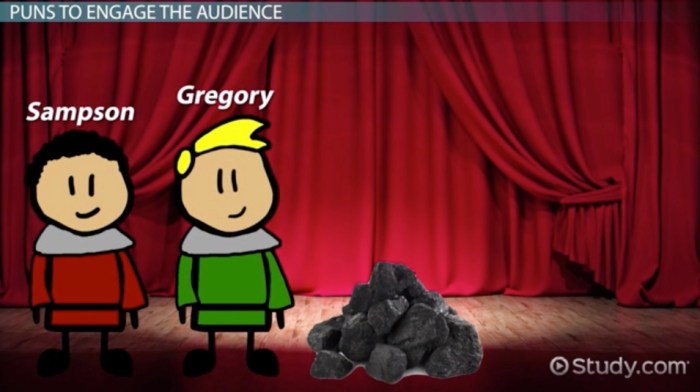
Puns were a common form of wordplay in Elizabethan England. They were used in everyday speech, as well as in literature. This was due in part to the fact that the English language was still evolving, and many words had multiple meanings.
Puns allowed speakers to play with these different meanings, creating humor and wit.
Puns in Everyday Language
- Puns were often used in conversation to make people laugh. For example, someone might say, “I’m so hungry, I could eat a horse!” This pun plays on the two meanings of the word “eat”: to consume food and to destroy something.
- Puns were also used to insult or criticize someone. For example, someone might say, “You’re so ugly, you make a scarecrow look like a supermodel!” This pun plays on the two meanings of the word “ugly”: unattractive and unpleasant.
Puns in Literature
- Puns were also a common feature of Elizabethan literature. William Shakespeare was particularly fond of using puns in his plays. In Romeo and Juliet, for example, Mercutio makes several puns throughout the play.
- Puns were used in literature to create humor, wit, and irony. They could also be used to foreshadow events or to reveal character traits.
The cultural and historical context of puns during the Elizabethan era helps to explain their use in Romeo and Juliet. Puns were a common form of wordplay that was used in both everyday speech and literature. They allowed speakers and writers to play with the different meanings of words, creating humor, wit, and irony.
Detailed FAQs
What is the significance of puns in Romeo and Juliet Act 2?
Puns in Act 2 contribute to the play’s wit, humor, and dramatic tension, providing insight into character personalities and emotions.
How does Mercutio use puns?
Mercutio’s puns reflect his wit, humor, and tragic nature, often foreshadowing events and adding comic relief to the play.
What role do puns play in the balcony scene?
Puns in the balcony scene create tension, foreshadow events, and reveal the characters’ emotions, adding depth and complexity to the pivotal moment.